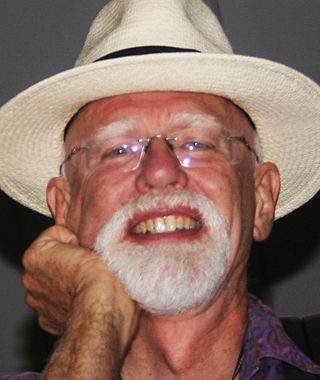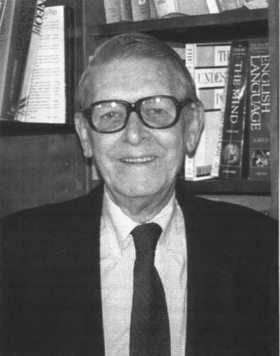Psychology is the study of mind and behavior. Its subject matter includes the behavior of humans and nonhumans, both conscious and unconscious phenomena, and mental processes such as thoughts, feelings, and motives. Psychology is an academic discipline of immense scope, crossing the boundaries between the natural and social sciences. Biological psychologists seek an understanding of the emergent properties of brains, linking the discipline to neuroscience. As social scientists, psychologists aim to understand the behavior of individuals and groups.

Pessimism is a mental attitude in which an undesirable outcome is anticipated from a given situation. Pessimists tend to focus on the negatives of life in general. A common question asked to test for pessimism is "Is the glass half empty or half full?"; in this situation, a pessimist is said to see the glass as half empty, or in extreme cases completely empty, while an optimist is said to see the glass as half full. Throughout history, the pessimistic disposition has had effects on all major areas of thinking.
Quality of life (QOL) is defined by the World Health Organization as "an individual's perception of their position in life in the context of the culture and value systems in which they live and in relation to their goals, expectations, standards and concerns".

Consumerism is a social and economic order in which the aspirations of many individuals include the acquisition of goods and services beyond those necessary for survival or traditional displays of status. It emerged in Western Europe before the Industrial Revolution and became widespread around 1900. In economics, consumerism refers to policies that emphasize consumption. It is the consideration that the free choice of consumers should strongly orient the choice by manufacturers of what is produced and how, and therefore orient the economic organization of a society. Consumerism has been criticized by both individuals who choose other ways of participating in the economy and environmentalists concerned about its impact on the planet. Experts often assert that consumerism has physical limits, such as growth imperative and overconsumption, which have larger impacts on the environment. This includes direct effects like overexploitation of natural resources or large amounts of waste from disposable goods and significant effects like climate change. Similarly, some research and criticism focuses on the sociological effects of consumerism, such as reinforcement of class barriers and creation of inequalities.

Kindness is a type of behavior marked by acts of generosity, consideration, rendering assistance, or concern for others, without expecting praise or reward in return. It is a subject of interest in philosophy, religion, and psychology.

Economic inequality is an umbrella term for a) income inequality or distribution of income, b) wealth inequality or distribution of wealth, and c) consumption inequality. Each of these can be measured between two or more nations, within a single nation, or between and within sub-populations.
Clinical psychology is an integration of human science, behavioral science, theory, and clinical knowledge for the purpose of understanding, preventing, and relieving psychologically-based distress or dysfunction and to promote subjective well-being and personal development. Central to its practice are psychological assessment, clinical formulation, and psychotherapy, although clinical psychologists also engage in research, teaching, consultation, forensic testimony, and program development and administration. In many countries, clinical psychology is a regulated mental health profession.
In sociology, postmaterialism is the transformation of individual values from materialist, physical, and economic to new individual values of autonomy and self-expression.

Love bombing is an attempt to influence a person by demonstrations of attention and affection. It can be used in different ways and for either positive or negative purposes. Psychologists have identified love bombing as a possible part of a cycle of abuse and have warned against it. It has also been described as psychological manipulation in order to create a feeling of unity within a group against a society perceived as hostile. In 2011, clinical psychologist Oliver James advocated love bombing in his book Love Bombing: Reset Your Child's Emotional Thermostat, as a means for parents to rectify emotional problems in their children.

Diseases of affluence, previously called diseases of rich people, is a term sometimes given to selected diseases and other health conditions which are commonly thought to be a result of increasing wealth in a society. Also referred to as the "Western disease" paradigm, these diseases are in contrast to "diseases of poverty", which largely result from and contribute to human impoverishment. These diseases of affluence have vastly increased in prevalence since the end of World War II.
Oliver James is a British psychologist, author, journalist, television producer and broadcaster.

Anti-consumerism is a sociopolitical ideology. It has been defined as "intentionally and meaningfully excluding or cutting goods from one's consumption routine or reusing once-acquired goods with the goal of avoiding consumption". The ideology is opposed to consumerism, being a social and economic order in which the aspirations of many individuals include the acquisition of goods and services beyond those necessary for survival or traditional displays of status.
The following outline is provided as an overview of and topical guide to the human self:

John W. Travis is an American author and medical practitioner. He is a proponent of the alternative medicine concept of "wellness", originally proposed in 1961 by Halbert L. Dunn, and has written books on the subject. In the 1970s, Travis founded the first "wellness center" in California. He originated the Illness–Wellness Continuum.

Social inequality occurs when resources within a society are distributed unevenly, often as a result of inequitable allocation practices that create distinct unequal patterns based on socially defined categories of people. Differences in accessing social goods within society are influenced by factors like power, religion, kinship, prestige, race, ethnicity, gender, age, sexual orientation, and class. Social inequality usually implies the lack of equality of outcome, but may alternatively be conceptualized as a lack of equality in access to opportunity.
Hyperconsumerism, hyper-consumerism, hyperconsumption or hyper-consumption is the consumption of goods beyond ones necessities and the associated significant pressure to consume those goods, exerted by social media and other outlets as those goods are perceived to shape one's identity. Frenchy Lunning defines it curtly as "a consumerism for the sake of consuming."
Ethan Anthony Couch killed four people at the age of 16 while driving under the influence on June 15, 2013, in Burleson, Texas. Couch, while intoxicated and under the influence of drugs, was driving on a restricted license and speeding in a residential area when he lost control of his vehicle, colliding with a group of people assisting another driver with a disabled SUV. Four people were killed in the collision, and nine people were injured. Two passengers in Couch's pickup truck suffered serious injuries, with one passenger suffering complete paralysis.
Carol Aneshensel was an American sociologist. She specialized in the sociology of mental health, focusing especially on how social inequalities lead to corresponding disparities in mental health. She was professor and vice chair for the Department of Community Health Sciences in the School of Public Health at University of California, Los Angeles (UCLA), before becoming professor emeritus.

William J. Ryan, Jr. was a psychologist, civil rights activist and author. He is best known for his exposure of the sociological phenomenon of "blaming the victim", which was first published in his 1971 book of the same name. Ryan's work is considered a major structuralist rebuttal to the Moynihan Report. Moynihan's report placed most of the blame for African-American poverty rates on the rise of single-parent households, which Ryan rejected as an example of blaming the victim.

The psychological impacts of climate change concerns effects that climate change can have on individuals' mental and emotional well-being. They may also relate to more generalised effects on groups and their behaviours, such as the urge to migrate from affected areas of the globe to areas perceived as less affected. These impacts can manifest in various ways and affect people of all ages and backgrounds. Some of the key psychological impacts of climate change include: emotional states such as eco-anxiety, ecological grief, eco-anger or solastalgia. While troublesome, such emotions may not appear immediately harmful and can lead to a rational response to the degradation of the natural world motivating adaptive action. However, there can be other effects on health, such as post-traumatic stress disorder (PTSD), for instance, as a result of witnessing or seeing reports of massive wildfires, which may be more dangerous.










